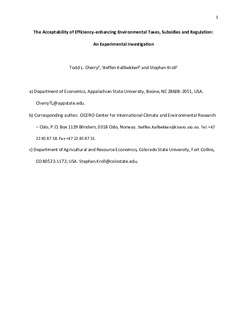The acceptability of efficiency-enhancing environmental taxes, subsidies and regulation: An experimental investigation
Peer reviewed, Journal article
Submitted version
Permanent lenke
http://hdl.handle.net/11250/2465385Utgivelsesdato
2012Metadata
Vis full innførselSamlinger
- Journal articles [468]
Sammendrag
Public opposition to efficiency-enhancing policies is a significant barrier to addressing many environmental challenges. We use a market experiment to explore the acceptability of three types of instruments: Pigouvian taxes and subsidies, and quantity regulation. We find that overall more than half of voters oppose efficiency-enhancing policies. The results replicate previous findings of tax aversion, and, by providing evidence of subsidy and regulation aversion, the estimates also suggest the existence of a broader aversion to market intervention. Voters supported subsidies significantly more than taxes while supporting quantity regulation significantly less than taxes. This is consistent with norms against coercive policy instruments. Concerning a possible trade-off between acceptability and efficiency, estimates indicate differences across instruments. Support for regulation relative to not having any policy in place increases considerably if inefficient half measures are proposed instead of efficient full measures. This is less true for taxes and subsidies. The language used to describe the policy also influences acceptability, which is particularly apparent in the case of the tax instrument.
